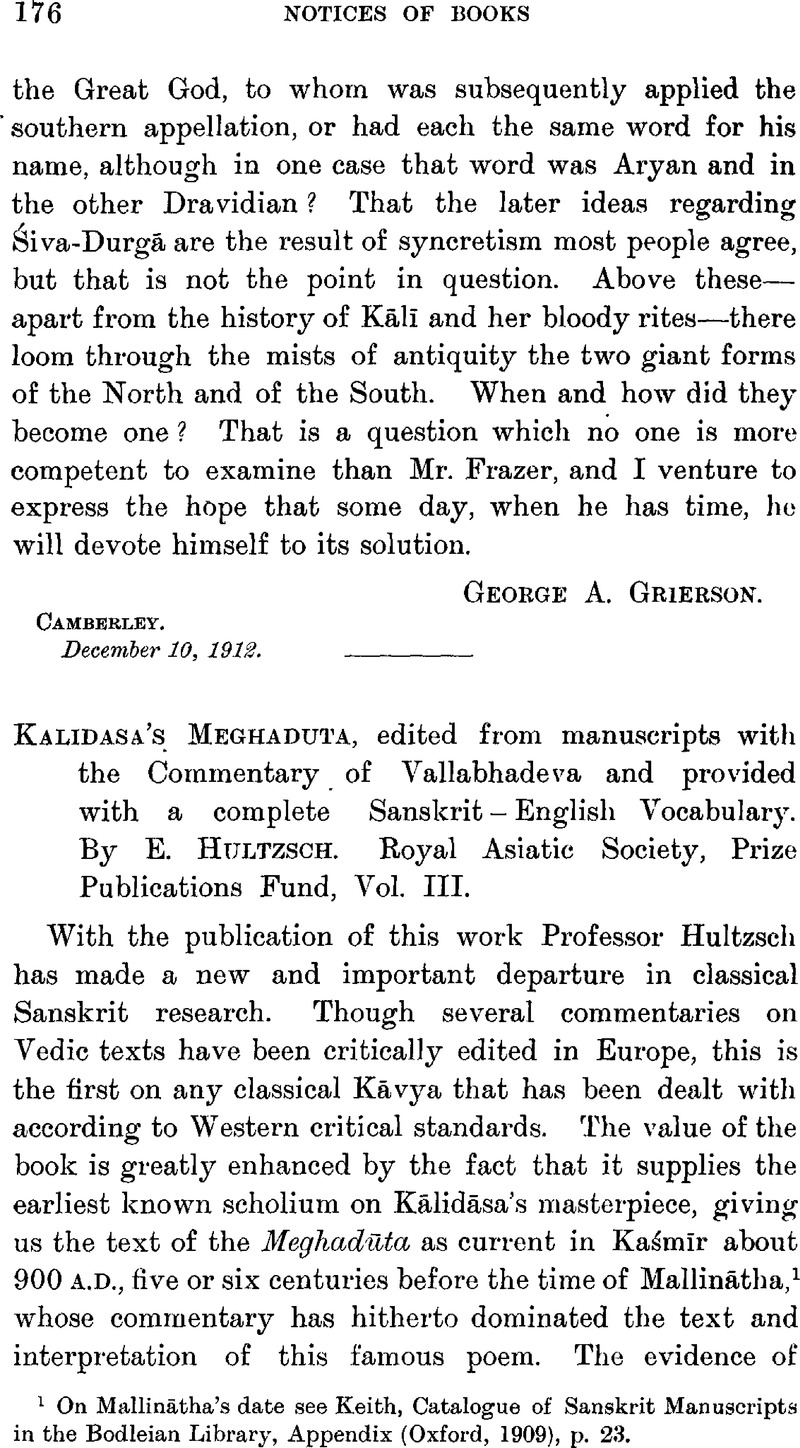No CrossRef data available.
Published online by Cambridge University Press: 15 March 2011

page 176 note 1 On Mallinātha's date see Keith, , Catalogue of Sanskrit Manuscripts in the Bodleian Library, Appendix (Oxford, 1909), p. 23.Google Scholar
page 177 note 1 The Nepal MS. mentioned below contains 110 stanzas.
page 177 note 2 Bonn, 1840, with critical notes and a Sanskrit-Latin vocabulary.
page 177 note 3 Breslau, 1874, with critical notes and a Sanskrit-German vocabulary.
page 177 note 4 Stanza 110 in his edition, beginning āśvāsyaivam.
page 177 note 5 See p. 64 of Professor Hultzsch's edition. It is omitted in the Nepal MS. of the Meghadūta.
page 178 note 1 In his edition of the Meghadūta, Calcutta, 1869.Google Scholar
page 178 note 2 A commentary composed in Cochin State, probably three centuries ago, and edited by Pandit R. V. Krishnamachariar, Srirangam, 1909; see Professor Hultzsch's notes, pp. 34, 38.
page 178 note 3 This stanza, in which the differences amount to twenty-four syllables, is one of those considered an interpolation by Īśvarachandra Vidyāsāgara. It may be noted that the third line, in which the variations are greatest, in Vallabhadeva's text reads dhunvan vātaiḥ sajalapṛṣataiḥ kalpavṛkṣāṃśukāni. The reading of the Nepal MS. is identical with this except that it has svajala- for sajala-.
page 179 note 1 Edited by Pathak, Poona, 1894.
page 179 note 2 The Nepal MS. also has nine spurious stanzas.
page 179 note 3 Berlin, 1907.
page 179 note 4 Cf. Professor Hultzsch's synoptical table.
page 180 note 1 This is also the reading of the fourteenth century Nepal MS.
page 180 note 2 The commentary expressly says that the form in the text is the nominative, not the vocative, and that brūyad is used because the third person is required (āyuṣmān iti vacane kartṛpadaṃ na tv āmantraṇam; brūyād iti prathamapuruṣaprayogāt).
page 180 note 3 This is also the reading of the Nepal MS.
page 180 note 4 Visarga being dropped before a sibilant followed by a mute, according to the optional rule stated in the Vārttika on Pāṇini, viii. 3, 36. This dropping is required by the Prātiśākhyas in Vedic texts. It is applied throughout by Aufrecht in his edition of the Rigveda; cf. Macdonell, , Vedic Grammar, 78, 2.Google Scholar
page 181 note 1 Cf. the alternative readings pratidiśam and pratidinam in Thomas' edition of the Kavīndravacanasamuccayaḥ, Bibliotheca Indica (Calcutta, 1911), p. 157, on stanza 503.Google Scholar
page 181 note 2 Supported by the Nepal MS.
page 181 note 3 Paraphrased by anukṣapam.
page 181 note 4 Jinasena and Mallinātha.
page 181 note 5 Cf. the somewhat similar contrast between the dark cloud and the brilliant rainbow in stanza 15.
page 181 note 6 This MS. has the reading pratidiśam in the above passage.
page 181 note 7 It is most unfortunate that the British Museum is one of the few libraries that still continue the policy of not lending MSS. and thus obstructing the progress of scholarship. MSS. are on quite a different footing from books, especially Oriental MSS., the students of which are few. The coincidence of a resident in London being inconvenienced by not finding an Oriental MS. lent for a short time to a public library elsewhere would scarcely ever occur. Oriental scholars are generally poor men who practically never receive any remuneration for editing texts. That they should have to incur the expense of a long journey as well for the purpose of collating a single MS. is to add a positive hardship. The result is that many a MS., the collation of which might have valuable results, is never consulted at all.
page 182 note 1 In one stanza (103) he has corrected the reading of the text, niśi in three MSS. and mayā in one, to sati, the comment of Vallabhadeva being he sati gunavati. The critical principle that the text supplied must represent the commentator's recension does not seem to be recognized in India, At any rate, an Indian scholar, who in a pamphlet published a few years ago was held up as a model of critical achievement, has in the very first line of the first stanza of the Meghadūta a different reading from that which Mallinātha explains in the commentary; a reading too which is not in agreement with Pāṇini, ii. 1, 39. What is the unfortunate student to do when confronted with such contradictions?
page 182 note 2 He says nothing about the Buddhist teacher Diṅnāga, to whom Mallinātha sees an allusion in stanza 14.
page 183 note 1 According to this rule the adjective should be vásavīya.
page 185 note 1 I may here draw attention to the fact that in the Stein Collection of Sanskrit MSS. from Kaśmīr there are copies of Vallabhadeva's commentaries on the Raghuvaṃśa and the Kumārasambhava; see JRAS. for 1912, pp. 596, 598.
page 185 note 2 Edited in the Kāvyamālā.
page 185 note 3 See also the supplementary list in the JRAS. for 1912, p. 735.